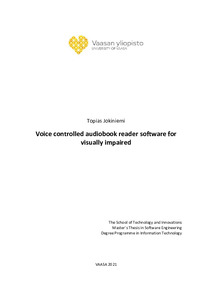Voice controlled audiobook reader software for visually impaired
Jokiniemi, Topias (2021-04-29)
Jokiniemi, Topias
29.04.2021
Julkaisun pysyvä osoite on
https://urn.fi/URN:NBN:fi-fe2021042928039
https://urn.fi/URN:NBN:fi-fe2021042928039
Tiivistelmä
This thesis results in a functional proof-of-concept level application that will help Pratsam Oy Ab to determine if voice-controlled audiobook player developed for Google Home device has potential to be a quality product. This thesis describes the development and the research of functional system that could be used as a starting point, in case it would be developed into a full product.
Before committing to a product development, software companies might want to test if the product concept is viable. The concept viability can be verified with research into possible development problems and with proof-of-concept level software. The proof-of-concept can explore if the product can be built at all, and if the quality would be high enough, so that it results in a profitable product.
In this product concept the user would use voice to control and to play Daisy 2.02 format audiobooks, which is an audiobook format developed for visually impaired. The audiobook reading software would be developed for Google Home device without a visual user interface.
Main technologies of the thesis are voice user interface, speech recognition, text-to-speech technologies, Google cloud platform, cloud-based MySQL database, Java REST API backend and a Java console application to parse data from Daisy audiobook files into the database.
The proof-of-concept period did not fully prove the viability of the concept. Google however has given clues that the required features would be added later, which could make it worth it to start developing the concept further.
Before committing to a product development, software companies might want to test if the product concept is viable. The concept viability can be verified with research into possible development problems and with proof-of-concept level software. The proof-of-concept can explore if the product can be built at all, and if the quality would be high enough, so that it results in a profitable product.
In this product concept the user would use voice to control and to play Daisy 2.02 format audiobooks, which is an audiobook format developed for visually impaired. The audiobook reading software would be developed for Google Home device without a visual user interface.
Main technologies of the thesis are voice user interface, speech recognition, text-to-speech technologies, Google cloud platform, cloud-based MySQL database, Java REST API backend and a Java console application to parse data from Daisy audiobook files into the database.
The proof-of-concept period did not fully prove the viability of the concept. Google however has given clues that the required features would be added later, which could make it worth it to start developing the concept further.
